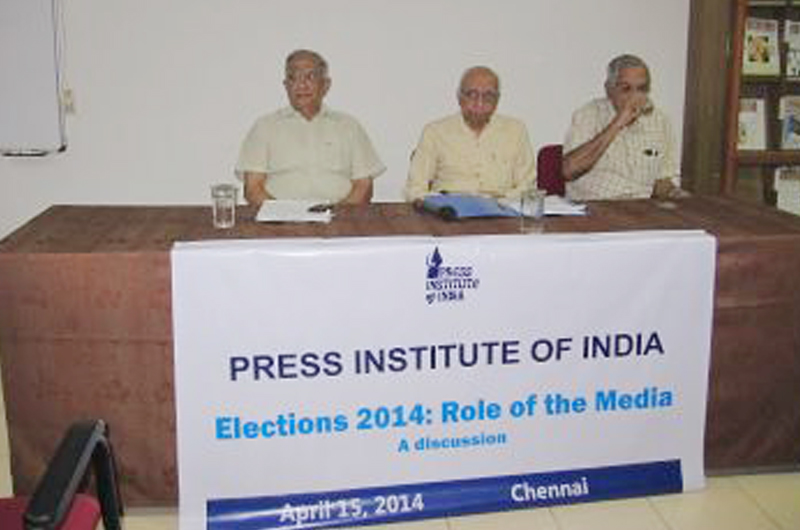Do opinion polls matter? Does the media matter in an election? Has the press in India functioned reasonably well despite various pitfalls? There were answers to these and several other questions at a discussion organised by the Press Institute of India on its campus on the afternoon of April 15. Participating and lending some gravitas as well as stimulus to a pertinent subject (especially with the General Elections on in India) – Elections 2014: Role of the Media – were three brilliant minds, each having led distinguished careers in government service – T.S. Krishnamurthy, former chief election commissioner of India; B.S. Raghavan, former policy adviser to UN (FAO), veteran columnist, and author; and G.V. Ramakrishna, former chairman, SEBI, and former member, Planning Commission.
The media needed to play a bridging role between the politician and the people, said Raghavan. He was of the view that overall, excluding the “black sheep”, the Indian media had acquitted itself reasonably well as far as coverage and adhering to ethical standards were concerned. He praised the Aam Admi Party for using social media as a tool to reach out to the people. Krishnamurthy, citing various cases, strung from his own experiences when he was chief election commissioner, said he would not really give such a clean chit (as Raghavan had done) to the media. He referred to a scathing attack made against him in a Delhi edition of a leading Kolkata-based newspaper. When he took up the matter with the newspaper, there was no apology or even a worthwhile reply. He desisted from going to the Press Council of India since it was likely to take five years to get some remedy.
The speakers were broadly in agreement about the important role the media played in creating awareness among the masses about elections and the need to vote. They highlighted the role played by private television channels owned by political parties in furthering the cause of their respective parties, often surreptitiously and despite the model code of conduct in vogue during election time. This was something the Election Commission had to constantly keep an eye on, they said. There was also the aspect of political messages being driven through advertisements. Krishnamurthy stressed the need for adequate regulations to curb such practice. Raghavan came up with the rather Utopian idea of there coming a time when the citizen can sit at home and vote by clicking on a button or the mouse. However, the citizen’s duty did not end with the casting of the vote, he cautioned. To the question whether the media was really relevant in an election, Ramakrishna said it indeed was. The whole exercise of the “dance of democracy” as it were, its varied nuances and flavours, had to be captured and recorded for the people, he was convinced.



 from Webdoux
from Webdoux